小学三至六年级英语知识点归纳总结
3至6年级英语全部笔记

3至6年级英语全部笔记一、引言本笔记旨在为3至6年级的学生及其家长提供英语学习的全面指导,涵盖了该阶段所需的词汇、语法、阅读、听力、口语、写作等各方面的详细笔记。
通过系统地梳理和归纳,希望能帮助学生们更好地掌握英语,为将来的学习打下坚实的基础。
二、词汇笔记1. 名词:包括各类物体、动物、人物、时间、地点等名词的拼写和用法。
例如:book, cat, girl, time, school。
2. 动词:注意不同时态的动词变化,如一般现在时、现在进行时、一般过去时。
例如:play, run, was, are, were。
3. 形容词和副词:理解形容词和副词的用法,以及它们在句子中的位置。
例如:happy, slowly, often。
4. 代词:掌握各类代词的用法,如我(I), 你(you), 他(he), 我们(we), 他们(they)。
5. 介词:理解介词的用法,如at, in, on, beside等,以及它们与名词或动名词的搭配。
三、语法笔记1. 时态:掌握并熟练运用英语的三大时态:现在时、过去时和将来时。
2. 句式结构:熟悉并掌握基本的句式结构,如主语+动词、There is/are等。
3. 主谓一致:理解并掌握主谓一致的规则。
4. 否定句:了解不同形式的否定句,如no+名词、not...any 等。
四、阅读笔记1. 阅读理解:学会从文章中获取信息,理解主旨和大意。
2. 句子理解:理解复杂句式和难懂词汇,提高阅读理解能力。
3. 快速阅读:掌握快速阅读技巧,提高阅读速度。
五、听力笔记1. 听力理解:学会听懂不同口音和语速的英语,提高听力理解能力。
2. 听写训练:通过听写训练,提高对单词和句子的记忆能力。
六、口语笔记1. 日常对话:熟练掌握日常对话,提高口语表达能力。
2. 角色扮演:通过角色扮演,提高口语交际能力。
3. 语音语调:注意英语语音语调的正确表达,增强口语表现力。
七、写作笔记1. 简单句写作:学会使用简单句写句子,表达清晰。
三年级到六年级英语知识点归纳总结

三年级到六年级英语知识点归纳总结
一、三年级英语知识点
1. 26个字母的学习:掌握26个字母的正确书写格式,并能够认识大写、小写字母,了解字母的顺序,能够听写字母。
2. 数字的学习:掌握1-10的数字,并能够进行简单的数字运算。
3. 颜色:了解常见的颜色,并能够听写英文表示颜色的单词。
4. 动物:了解常见的动物,并能够听写英文表示动物的单词。
5. 水果:了解常见的水果,并能够听写英文表示水果的单词。
6. 形状:了解常见的形状,并能够听写英文表示形状的单词。
7. 职业:了解常见的职业,并能够听写英文表示职业的单词。
8. 家庭成员:了解家庭成员之间的关系,并能够听写英文表示家庭成员的单词。
二、四年级英语知识点
1. 天气:了解常见的天气,并能够听写英文表示天气的单词。
2. 时间:掌握常用时间单位的表达方式,并能够听写英文表示时间的单词。
3. 季节:了解四季的季节特征,并能够听写英文表示季节的单词。
4. 学校生活:了解学校生活的方方面面,并能够听写英文表示
学校生活内容的单词。
5. 方向:掌握基本的方位表达方式,并能够听写英文表示方位的单词。
6. 日常活动:了解常见的日常活动,并能够听写英文表示日常活动内容的单词。
7. 爱好:了解常见的爱好,并能够听写英文表示爱好的单词。
小学英语三至六年级知识点归纳
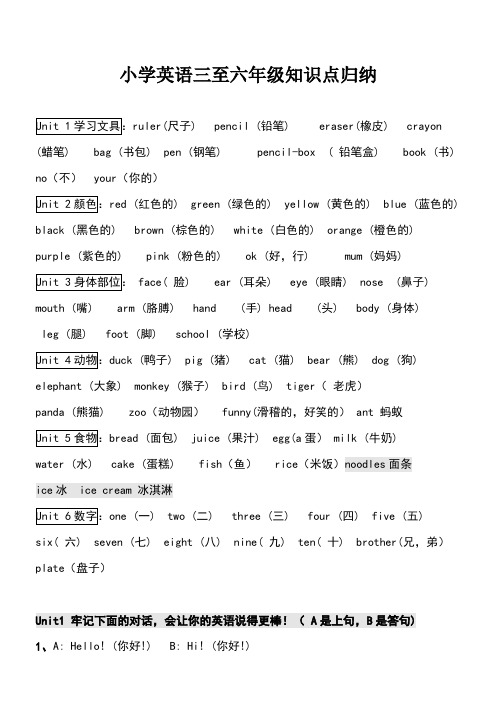
小学英语三至六年级知识点归纳ruler(尺子) pencil (铅笔) eraser(橡皮) crayon(蜡笔) bag (书包) pen (钢笔) pencil-box ( 铅笔盒) book (书) no(不) your(你的)red (红色的) green (绿色的) yellow (黄色的) blue (蓝色的) black (黑色的) brown (棕色的) white (白色的) orange (橙色的)purple (紫色的) pink (粉色的) ok (好,行) mum (妈妈)face( 脸) ear (耳朵) eye (眼睛) nose (鼻子)mouth (嘴) arm (胳膊) hand (手) head (头) body (身体)leg (腿) foot (脚) school (学校)duck (鸭子) pig (猪) cat (猫) bear (熊) dog (狗)elephant (大象) monkey (猴子) bird (鸟) tiger(老虎)panda (熊猫) zoo(动物园) funny(滑稽的,好笑的) ant 蚂蚁bread (面包) juice (果汁) egg(a蛋) milk (牛奶)water (水) cake (蛋糕) fish(鱼) rice(米饭)noodles面条ice冰 ice cream 冰淇淋one (一) two (二) three (三) four (四) five (五)six( 六) seven (七) eight (八) nine( 九) ten( 十) brother(兄,弟)plate(盘子)Unit1 牢记下面的对话,会让你的英语说得更棒!( A是上句,B是答句)1、A: Hello! (你好!) B: Hi! (你好!)2、A:What’s your name?你叫什么名字?B:My name’s Chen Jie.我的名字是陈洁。
三至六年级英语单词归纳

三至六年级英语单词归纳三年级上册。
一、文具类。
1. pen [pen] n. 钢笔。
2. pencil ['pensl] n. 铅笔。
3. pencil - box ['pensl bɒks] n. 铅笔盒。
4. ruler ['ruːlə(r)] n. 尺子。
5. eraser [ɪ'reɪzə(r)] n. 橡皮。
二、颜色类。
1. red [red] adj. 红色的。
2. green [ɡriːn] adj. 绿色的。
3. yellow ['jeləʊ] adj. 黄色的。
4. blue [bluː] adj. 蓝色的。
5. black [blæk] adj. 黑色的。
6. white [waɪt] adj. 白色的。
三、身体部位类。
1. head [hed] n. 头。
2. face [feɪs] n. 脸。
3. nose [nəʊz] n. 鼻子。
4. mouth [maʊθ] n. 嘴。
5. eye [aɪ] n. 眼睛。
6. ear [ɪə(r)] n. 耳朵。
7. arm [ɑːm] n. 手臂。
8. hand [hænd] n. 手。
9. leg [leɡ] n. 腿。
10. foot [fʊt] n. 脚(复数feet [fiːt])三年级下册。
一、动物类。
1. cat [kæt] n. 猫。
2. dog [dɒɡ] n. 狗。
3. monkey ['mʌŋki] n. 猴子。
4. panda ['pændə] n. 熊猫。
5. duck [dʌk] n. 鸭子。
6. pig [pɪɡ] n. 猪。
7. bird [bɜːd] n. 鸟。
8. bear [beə(r)] n. 熊。
9. elephant ['elɪfənt] n. 大象。
10. tiger ['taɪɡə(r)] n. 老虎。
三至六年级英语知识点总结人教版
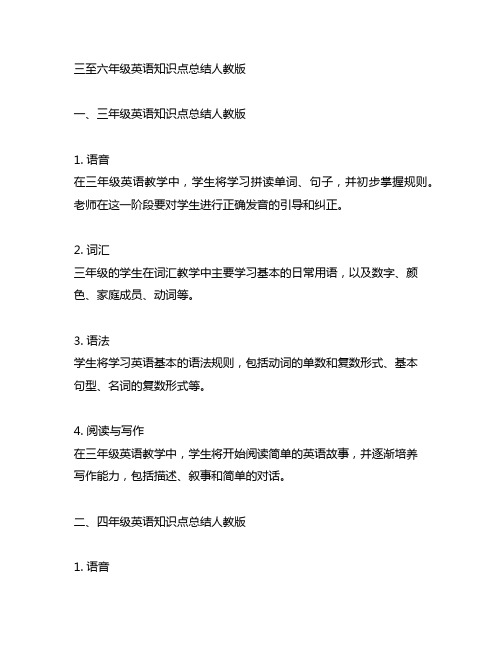
三至六年级英语知识点总结人教版一、三年级英语知识点总结人教版1. 语音在三年级英语教学中,学生将学习拼读单词、句子,并初步掌握规则。
老师在这一阶段要对学生进行正确发音的引导和纠正。
2. 词汇三年级的学生在词汇教学中主要学习基本的日常用语,以及数字、颜色、家庭成员、动词等。
3. 语法学生将学习英语基本的语法规则,包括动词的单数和复数形式、基本句型、名词的复数形式等。
4. 阅读与写作在三年级英语教学中,学生将开始阅读简单的英语故事,并逐渐培养写作能力,包括描述、叙事和简单的对话。
二、四年级英语知识点总结人教版1. 语音四年级学生将继续学习英语的基本语音,并增加了一些复杂的音标和发音规则。
2. 词汇在四年级英语教学中,学生将学习更加丰富的词汇,包括日常用语、动词短语、方位、时间、气候等。
3. 语法四年级学生将学习更加丰富和复杂的语法知识,包括时态、副词、形容词比较级和最高级等。
4. 阅读与写作在四年级英语教学中,学生将进一步提高阅读理解能力,学会用英语进行简单的书面表达,包括简单的作文、书信和日记。
三、五年级英语知识点总结人教版1. 语音五年级学生将继续巩固和扩展英语的语音知识,学会正确地发音和拼读包括复杂单词和句子在内的英语内容。
2. 词汇在五年级英语教学中,学生将学习更加丰富和复杂的词汇,包括日常用语、情感词汇、习惯用语、动词短语等。
3. 语法五年级学生将学习更加丰富和复杂的语法知识,包括主谓一致、语态、虚拟语气、倒装句等。
4. 阅读与写作五年级英语教学中,学生将进一步提高阅读理解能力,学会用更加丰富的语句进行书面表达,包括对话、判断、议论和叙述等。
四、六年级英语知识点总结人教版1. 语音六年级学生将继续巩固和扩展英语的语音知识,学会正确地发音和拼读更复杂的单词和句子。
2. 词汇在六年级英语教学中,学生将学习更加丰富和复杂的词汇,包括各类专业词汇、习惯用语、动词短语等。
3. 语法六年级学生将学习更加丰富和复杂的语法知识,包括倒装句、虚拟语气、被动语态等。
知识汇总小学3~6年级英语语法大全,老师推荐收藏!
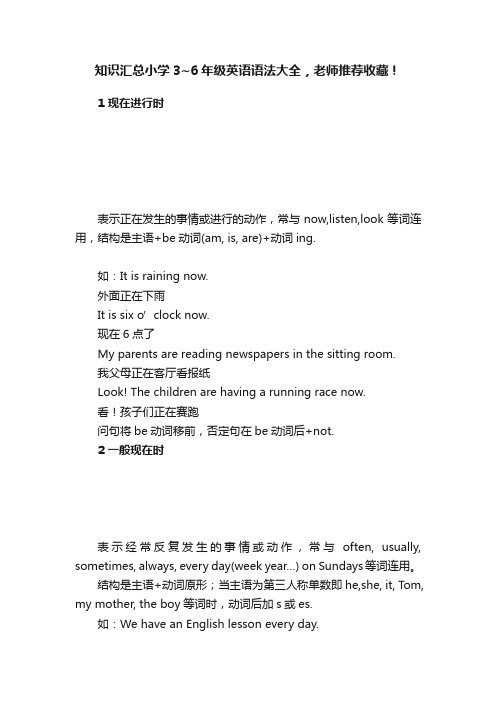
知识汇总小学3~6年级英语语法大全,老师推荐收藏!1 现在进行时表示正在发生的事情或进行的动作,常与now,listen,look等词连用,结构是主语+be动词(am, is, are)+动词ing.如:It is raining now.外面正在下雨It is six o’clock now.现在6点了My parents are reading newspapers in the sitting room.我父母正在客厅看报纸Look! The children are having a running race now.看!孩子们正在赛跑问句将be动词移前,否定句在be动词后+not.2 一般现在时表示经常反复发生的事情或动作,常与often, usually, sometimes, always, every day(week year…) on Sundays等词连用。
结构是主语+动词原形;当主语为第三人称单数即he,she, it, Tom, my mother, the boy等词时,动词后加s或es.如:We have an English lesson every day.我们每天都要上英语课Do the boys run faster than the girls? Yes, they do.男孩比女孩跑的快吗?是的问句借助于do, does否定句借助于don’t, doesn’t,后面动词一定要还原。
3 一般过去时表示发生在过去的事情或存在的状态,常与just now; a moment ago; … ago; yesterday; last ( week; month; year; Monday; weekend); this morning等词连用。
结构是主语+be动词的过去式(was; were)或主语+动词的过去式。
注意:be动词与动词过去式不可同时使用。
如:My earphones were on the ground just now.我的耳机刚刚还在呢。
三至六年级英语知识点归纳
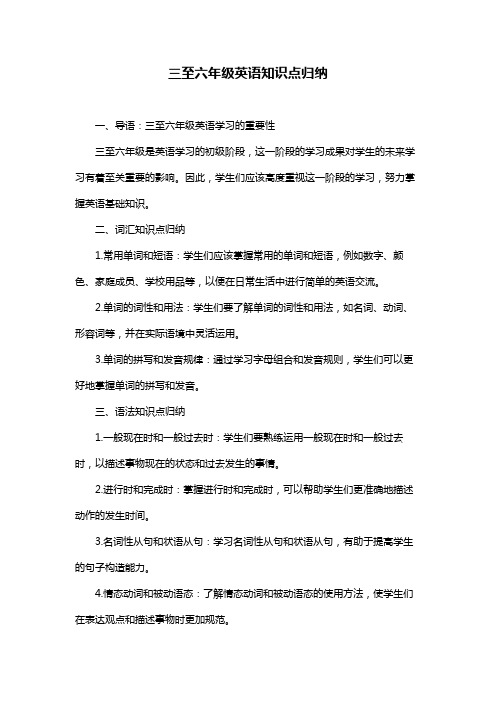
三至六年级英语知识点归纳一、导语:三至六年级英语学习的重要性三至六年级是英语学习的初级阶段,这一阶段的学习成果对学生的未来学习有着至关重要的影响。
因此,学生们应该高度重视这一阶段的学习,努力掌握英语基础知识。
二、词汇知识点归纳1.常用单词和短语:学生们应该掌握常用的单词和短语,例如数字、颜色、家庭成员、学校用品等,以便在日常生活中进行简单的英语交流。
2.单词的词性和用法:学生们要了解单词的词性和用法,如名词、动词、形容词等,并在实际语境中灵活运用。
3.单词的拼写和发音规律:通过学习字母组合和发音规则,学生们可以更好地掌握单词的拼写和发音。
三、语法知识点归纳1.一般现在时和一般过去时:学生们要熟练运用一般现在时和一般过去时,以描述事物现在的状态和过去发生的事情。
2.进行时和完成时:掌握进行时和完成时,可以帮助学生们更准确地描述动作的发生时间。
3.名词性从句和状语从句:学习名词性从句和状语从句,有助于提高学生的句子构造能力。
4.情态动词和被动语态:了解情态动词和被动语态的使用方法,使学生们在表达观点和描述事物时更加规范。
四、阅读和写作技巧1.阅读理解策略:学生们要学会运用阅读理解策略,如预测、扫描、细读等,提高阅读效果。
2.写作结构和方法:掌握写作的基本结构和方法,如开头、正文、结尾等,使文章条理清晰。
3.提高阅读和写作水平的建议:多读、多写、多练,积累词汇和语法知识,不断提高阅读和写作水平。
五、口语交际知识点归纳1.日常问候和礼貌用语:学生们要熟练掌握日常问候和礼貌用语,如Hello、Good morning、Thank you等。
2.描述人和事物的方法:学会用英语描述人和事物,如外貌、性格、喜好等。
3.表达喜好和意见的方式:学生们要学会用英语表达自己的喜好和意见,如I like、I don"t like等。
六、学习方法和习惯1.制定学习计划和目标:学生们要制定合理的学习计划和目标,有针对性地进行学习。
三到六年级英语知识点汇总

小学英语词汇归类表(三年级上册----六年级下册) 一、学习用品(school things) pen(钢笔)? pencil(铅笔)?? pencil-case(铅笔盒) ?ruler(尺子)?? book(书)? post card(明信片) comic book(漫画书)? bag(包)? newspaper(报纸)?? schoolbag (书包)?? eraser(橡皮)??? crayon(蜡笔)?? sharpener(卷笔刀)?? story-book(故事书)?notebook(笔记本)? Chinese book(语文书)? English book(英语书)? math book(数学书) magazine(杂志)? dictionary(字典,词典)二、人体(body)foot(脚)? nose(鼻子)?? head(头)? face(脸)? hair(头发)? mouth(嘴)? eye(眼睛)? ear(耳朵)? arm(手臂)? hand(手)?finger(手指)? leg(腿)? tail(尾巴)三、颜色(colours)colour(颜色)? red(红) blue(蓝)? yellow(黄) green(绿)white(白)black(黑)? pink(粉红)???? purple(紫)???? orange(橙)???? brown(棕)四、动物(animals)cat(猫)dog(狗)pig(猪)duck(鸭)rabbit(兔)horse(马)elephant(大象)fish(鱼)kangaroo(袋鼠)ant(蚂蚁)??? bird(鸟)? eagle(鹰)? beaver(海狸)? snake(蛇)? mouse(老鼠)? squirrel(松鼠)? monkey(猴)? panda(熊猫)? bear(熊)? lion(狮子)? tiger(老虎)? fox(狐狸)? zebra(斑马)? deer(鹿)???? giraffe(长颈鹿)? goose(鹅)? hen(母鸡)? turkey(火鸡)? lamb(小羊)? sheep(绵羊)? goat(山羊)? cow(奶牛)? donkey(驴)? squid(鱿鱼)? lobster(龙虾)? shark(鲨鱼)? seal(海豹)? sperm whale(抹香鲸)? killer whale(虎鲸)五、人物(people)friend(朋友)?? boy(男孩)? girl(女孩) mother(母亲)father(父亲)sister(姐妹)? brother(兄弟) uncle(叔叔,舅舅)mom(妈妈)grandpa/ grandfather(祖父,外祖父)?? man(男人)??? woman(女人)????? Mr(先生)?? Miss(小姐)???? lady(女士,小姐)? dad(爸爸)?? ?parents(父母)????? grandma/ grandmother(祖母,外祖母)? aunt(姑姑)? cousin(堂表兄弟,堂表姐妹)?? son(儿子)??? baby(婴儿)???? kid(小孩)? classmate(同学)? queen(女王)??? visitor(参观者)?? neighbour(邻居)? principal(校长)? university student(大学生)??? pen pal(笔友)??? tourist(旅行者)? people(人物)? robot(机器人)六、职业(jobs)teacher(教师)student(学生)doctor(医生) nurse(护士)driver(司机)farmer(农民)singer(歌唱家)writer(作家)actor(男演员)actress(女演员)artist(画家)TV reporter(电视台记者)engineer(工程师)accountant(会计) policeman(警察)salesperson(销售员)cleaner(清洁工)? baseball player(棒球运动员)? assistant(售货员)七、食品、饮料(food & drink)rice(米饭) bread(面包)? beef(牛肉) milk(牛奶)water(水)egg(蛋)fish(鱼) tofu(豆腐)chicken(鸡肉)? honey(蜂蜜)?? lunch(中餐) cake(蛋糕)?? hot dog(热狗)? hamburger(汉堡包)? French fries(炸薯条)?? cookie(曲奇)? biscuit(饼干)? jam(果酱)?? noodles(面条)?? meat(肉)?? pork(猪肉)? mutton(羊肉)? vegetable(蔬菜)? salad(沙拉)?? soup(汤)? ice-cream(冰淇淋)ice(冰)? Coke(可乐) juice(果汁)? tea(茶) coffee(咖啡)?? breakfast(早餐) dinner(晚餐)?八、水果、蔬菜(fruit & vegetables)apple(苹果)? banana(香蕉) watermelon(西瓜)??? pear(梨)orange(橙)grape(葡萄)eggplant(茄子)green beans(青豆)tomato(西红柿)potato(土豆)? peach(桃)????? strawberry(草莓)?? cucumber(黄瓜)????? onion(洋葱)?????? carrot(胡萝卜)? cabbage(卷心菜)?九、衣服(clothes)jacket(夹克衫)shirt(衬衫)T-shirt(T恤衫) shirt(短裙子)dress(连衣裙)jeans(牛仔裤)pants(长裤) socks(袜子)??? shoes(鞋子)?? sweater(毛衣)???? coat(上衣)?? raincoat(雨衣)? shorts(短裤)??? sneakers(网球鞋)? slippers(拖鞋)???? sandals(凉鞋)?? boots(靴子)??????? hat(有沿的帽子)? cap(便帽)??tie(领带)? scarf(围巾)???? gloves(手套)?? sunglasses(太阳镜)??十、交通工具(vehicles)bike(自行车)?? bus(公共汽车)train (火车)?? boat(小船)? ship(轮船)? yacht(快艇)?? car(小汽车)?? taxi(出租车)???? jeep(吉普车)? van(小货车)? plane(飞机)? subway(地铁)????? motor cycle(摩托车) 十一、杂物(other things)window(窗户)? door(门)? computer(计算机)???? desk(课桌)?? chair(椅子)???? bed(床)???board(写字板)teache r’s desk(讲台) fan(风扇)????? light(灯)wall(墙壁)?? floor(地板)???? picture(图画,照片)curtain(窗帘)?? closet(壁橱) trash bin(垃圾箱) mirror(镜子) end table(床头柜)football(足球)? present(礼物) walkman(随身听)? lamp(台灯)???? phone(电话)????????? sofa(沙发)???? shelf(书架)?fridge(冰箱)????? table(桌子)???? air-conditioner(空调)??? TV(电视)?????? key(钥匙)? lock(锁)???????? photo(照片)???? chart(图表)??????????? plate(盘子)?? knife(刀)?? fork(叉)?? spoon(勺子)???? chopsticks(筷子)?????? pot(锅)????? gift (礼物)???? toy(玩具)??????? doll(洋娃娃)??? jigsaw puzzle(拼图游戏)? ball(球)????? kite(风筝)??? balloon(汽球)???? box(盒子)????? umbrella(伞)????????? zipper(拉链)?? violin(小提琴)? yo-yo(溜溜球)??? nest(鸟窝)????? toothbrush(牙刷)?? hole(洞)???? tube(管子)??? menu(菜单)???? e-card(电子贺卡)?e-mail(电子邮件)????? money( 钱)?? medicine(药)十二、地点(locations)home(家)room(房间)?????? living room(起居室,客厅)bedroom(卧室)??? study(书房)?kitchen(厨房)?? bathroom(卫生间)?? classroom(教室)school(学校)park(公园)????? library(图书馆)?????? post office(邮局) hospital(医院)? cinema(电影院) bookstore(书店)farm(农场)?? zoo(动物园)?? garden(花园)?? playground(操场)? canteen(食堂)????? gym(体育馆)?? teacher’s office(教师办公室)? washroom(卫生间)? art room(绘画教室) music room(音乐教室)? computer room(计算机教室) TV room(电视机房)? flat(公寓)???????? company(公司)??????? factory(工厂)??? fruit stand(水果摊)? pet shop(宠物商店) naturepark(自然公园)? theme park(主题公园)????? supermarket(超市)bank(银行)?? the Great Wall(长城)?? science museum(科学博物馆)?? country(国家)? village(乡村)? city(城市)?十三、课程(classes)class(课程)Chinese(中文,汉语)English(英语)math(数学)P.E.(体育) music(音乐) science (科学)? ?sports(体育活动)? Moral Education(思想品德课)? Social Studied(社会课)十四、国家、城市(countries & cities)China/ PRC(中国)? American/ USA(美国)? UK(联合王国)???? England(英国)? Canada/ CAN(加拿大)?? Australia(澳大利亚)? ?New York(纽约)?? ?London(伦敦)? Sydney(悉尼)?? Moscow(莫斯科)?? Cairo(开罗)十五、天气(weather)cold(寒冷的) warm(温暖的)cool(凉爽的) snowy(下雪的)sunny(晴朗的)hot(炎热的) rainy(下雨的) windy(有风的)? cloudy(多云的) weather report(天气预报)十六、景物(nature)river(河流) lake(湖泊) stream(河、溪)forest(森林)???? path(路,小道)? road(公路,大道)house(房子bridge(桥)building(建筑物)rain(雨)?? cloud(云)? sun(太阳) mountain(山) ?sky(天空)? ?rainbow(彩虹) ?wind(风)??? air(空气)十七、植物(plants)flower(花)grass(草)seed(种子)sprout(苗,芽,嫩芽)tree(树) ?plant(植物,种植)soil(土壤)rose(玫瑰)????????? leaf(叶子)?十八、星期(week)Monday/ Mon. (星期一)Tuesday /Tue. (星期二)?? Wednesday /Wed. (星期三)Thursday /Thu. (星期四)? Friday /Fri. (星期五) Saturday /Sat. (星期六)Sunday /Sun. (星期日)?? weekend(周末)十九、月份(months)Jan.(January 一月)Feb.(February 二月) Mar.(March 三月)Apr.(April 四月)May(五月)June(六月)July(七月)Aug.(August 八月)Sept.(September 九月)Oct.(October十月)Nov.(November 十一月) ?Dec.(December十二月)二十、季节(seasons)spring(春)summer(夏)fall(秋)winter(冬)二十一、方位(directions)left(左边)right(右边) east(东)????? west(西)????? south(南)?? north(北)二十二、患病(illness)hurt(疼痛)sore(疼的)? ?have a cold(感冒)????? have a fever(发烧)? ??? have a toothache(牙疼)have a headache(头疼)have a sore throat(喉咙疼)二十三、数词(numbers)one(一) two(二) three(三) ?four(四) five(五)?? six(六)seven(七)? eight(八)nine(九)ten(十) eleven(十一) twelve(十二)thirteen(十三)fourteen(十四)? fifteen(十五)sixteen(十六)? seventeen(十七) eighteen(十八)? nineteen(十九)? twenty(二十) thirty(三十)?? forty(四十) ?fifty(五十)??? sixty(六十) seventy(七十)? eighty(八十)? ninety(九十)? hundred(百)??? first(第一)? second(第二)?? third(第三)???? fourth(第四)? fifth(第五)?eighth(第八)?? ninth(第九)???? twelfth(第十二) ?twentieth(第二十)二十四、形容词(adj.)good(好的)????????? big(大的)?? small(小的)?? long(长的)? tall(高的)short(短的,矮的)young(年轻的) old(旧的,老的)strong(健壮的)thin(瘦的)active(积极活跃的)quiet(安静的)? kind(和蔼亲切的)strict(严格的)smart(聪明的)funny(滑稽可笑的)? tasty(好吃的)? sweet(甜的)???salty(咸的)sour(酸的)favourite(最喜爱的)? fresh(新鲜的) clean(干净的)?? tired(疲劳的)excited(兴奋的)angry(生气的,愤怒的)happy(高兴的) sad(忧愁的,悲伤的) bored(无聊的,烦人的) taller(更高的)shorter(更矮的)stronger(更强壮的)older(年龄更大的)younger(更年轻的)bigger(更大的)heavier(更重的) longer(更长的)thinner(更瘦的)smaller(更小的) nice(好看的)? fine(好的)? great(很好的)? heavy(重的)? new(新的)? fat(胖的)? happy(快乐的)? right(对的)? hungry(饥饿的)? cute(逗人喜爱的)?little(小的)? lovely(可爱的)? beautiful(漂亮的)? colourful(色彩鲜艳的)? pretty(漂亮的)? cheap(便宜的)? expensive(昂贵的)? juicy(多汁的)? tender(嫩的)? healthy(健康的)? ill(有病的)? helpful(有帮助的)? high(高的)? easy(简单的)? proud(骄傲的)? sick(有病的)? better(更好的) higher(更高的)二十五、介词(prep.)in(在……里)??? ? on(在……上,在……时候)?? under(在……下面)near(在……旁边)? behind(在……后面)?? next to(与……相邻)at(在……点钟) by(经……乘……)?for(为……,给……) to(朝,向) over(在……上方)????? in front of(在……前面)二十六、代词(pron.)I(我)me ?we(我们)us ?you(你,你们)you ?he(他)him? she(她)her it(它)it? they(他/她/它们)themmy(我的)mine our(我们的)ours your(你的,你们的)yours his(他的)his her(她的)hers? this(这,这个)? that(那,那个)二十七、动词(v.)work(工作)??????????? play(玩,踢)?????????? swim(游泳)???????????? skate(滑冰)? fly(飞)?? ?jump(跳) ?walk(走) run(跑)? climb(往上爬) ?fight(打架)???????????? swing(荡)??? eat(吃)? sleep(睡觉)?? ?like(像,喜欢) ?have(有,吃)?? ?turn(转弯)?buy(买)? ?take(买,带)? ?live(居住)?? ?teach(教)? stop(停,停车站)?? wait(等)? study(学习)??learn(学习)? sing(唱歌)??? dance(跳舞)??? row(划)??? do homework(做作业)? ?watch TV(看电视)???? ?read books(读书)? cook the meals(做饭)????? ?water the flowers(浇花)?????? sweep the floor(扫地)???? clean the bedroom(打扫卧室)? make the bed(铺床)?????????? set the table(摆饭桌)???? wash the clothes(洗衣服)????? do the dishes(洗碗碟)???????? use acomputer(使用计算机)? eat breakfast(吃早饭)???????? eat dinner(吃晚饭)??? do morning exercises(晨练,做广播操)???????? go toschool(上学)??????????? play sports(进行体育运动)???? get up(起床)?????????? have English class(上英语课)?? climb mountains(爬山)?????? play the piano(弹钢琴)??? fly kites(放风筝)????????????? make a snowman(堆雪人)???? plant trees(种树) draw pictures(画画)?????????? cook dinner(做饭)?????????? read a book(看书)???????? answer the phone(接电话)???? listen to music(听音乐)??????? clean the room(打扫房间)? write a letter(写信)?????????? write an e-mail(写电子邮件)?? drink water(喝水) take pictures(照相)?????????? watch insects(观察昆虫)?????? pick up leaves(采摘树叶)? do an experiment(做实验)???? catch butterflies(捉蝴蝶)???? ?count insects(数昆虫)? collect insects(收集昆虫)????? collect leaves(收集树叶)?????? write a report(写报告)? play chess(下棋)???????????? have a picnic(举行野餐)?????? get to(到达)? ride a bike(骑自行车)??????? play the violin(拉小提琴)?????? make kites(制作风筝)? collect stamps(集邮)????? ???go shopping(买东西)?????????? go swimming(去游泳)? go fishing(去钓鱼)?????????? go hiking(去远足)???????????? go skiing(去滑雪)? go ice-skating(去滑冰)??????? visit grandparents(看望祖父母/外祖父母) meet(见面)??????welcome(欢迎)????? thank(谢谢)?????? love(爱)?????? drink(喝)? taste(尝)???????? smell(闻)?????????? feed(喂养)???????shear(剪)?????? milk(挤奶)? look(看)???????? guess(猜)?????????? help(帮助)??????? pass(传递)???? show(展示)? use(使用)??????? clean(打扫)???????? open(打开)??????? close(关上)??? put(放)????? read(读)???????? write(写)?????????? paint(绘画)??????? tell(告诉)????? kick(踢)? bounce(反弹)???? ride(骑)??????????? find(寻找)??????? drive(驾驶)???? fold(折)? send(寄)????????wash(洗)????????? shine(照耀)??????? become(变成)??? feel(感觉到)? think(思考)????? fall(落下)????????? leave(离开)??????? wake up(醒来)??? put on(穿上)? take off(脱掉)??? hang up(挂起)?????wear(穿)????? go home(回家)?????????? go to bed(上床睡觉)?????? play computer games(玩电脑游戏)? do housework(做家务)??? empty the trash(倒垃圾)???? put away the clothes(收拾衣服)??? get off(下车)??????????? take a trip(去旅行)????????? read a magazine(阅读杂志)?????? go to the cinema(去看电影)二十八、其他(others)day(天,日子)??????? today(今天)???????? date(日期)??????? yes(是,是的)??????? no(不,不是)????????? not(不,不是的)?????? o’clock(……点钟)? time(时间)??????? here(这儿,这里)???? there(那儿,那里)??? very(很,非常)??? but(但是) then(然后) ??????????and(和)???????????? too(也,太)?????? next week(下周)? last(上一个,仅余的,留在最后的)???????? noon(中午)??????? evening(夜晚,晚上) please(请)?????????? usually(通常,一般)?? often(经常)?????? sometimes(有时候)? hobby(兴趣,爱好)??best(最,极)????????? because(因为)??? straightly(成直线地) birthday(生日)?????? traffic(交通)???????? traffic light(交通灯) traffic rule(交通规则)? matter(事情,麻烦)? should(应该)???????? comefrom(从……来,来自……) this morning(今天上午) ???this afternoon(今天下午) ???this evening(今天晚上)二十九、动词的第三人称单数形式watch—watches??? teach—teaches? wash--washes? go—goes?? do—does???have—has?? ?read—reads?????? live—lives??三十、动词的-ing形式run—running????? swim—swimming??? shop—shopping?? sit—sitting? put—putting have—having????? live—living????? ?make—making?????? take—taking??? use—using? dive—diving? ?write—writing ?ride—riding?? go—going????????? do—doing??????? walk—walking?????? jump—jumping?climb—climbing??? play—playing???? teach—teaching????? catch—catching ???watch—watching?? read—reading???? cook—cooking??????? clean—cleaning??? answer—answering listen—listening??? collect—collecting??? count—counting?三十一、动词的过去式watch—watched ?wash—washed is/am—was are—were clean—cleaned????? play—played? visit—visited?? learn—learned?? climb—climbed???? row—rowed? dance—danced? do—did?? go—went? sing—sang?? eat—ate? take—took?????????? have—had see—saw?? buy—bought? read—read ?hurt—hurt?? draw—drew?? put--put三十二、形容词的比较级tall—taller??? short—shorter?old—older? ?young—younger? small—smaller?????? long—longer? ?strong—stronger? big—bigger???????? thin—thinner? heavy—heavier?三十三、疑问词what(什么)???????? which(哪一个)?????? when(什么时候)?????? where(在哪里)? why(为什么)?????? how(怎样,如何)???? how many(多少)????? how much(多少钱)? what about…(……怎么样)? what time(几点)?三十四、单词的缩写I’m = I am?? ?it’s = it is????? he’s = heis?? ?she’s = she is ??that’s = that is?????? who’s = who is??? what’s = what is ?????they’re = they are ????isn’t = is not? ????aren’t = are not ??can’t = cannot????? don’t = do not??????? doesn’t = does not?? ???let’s = let us三十五、同音词one—won?? two--too?? four—for? by—buy? red—read? no—know? flour—flower wear—where? there—their? pair--pear? ear—year? ?flu--flew? hear—here? I—eye? B—be? C—see? R—are? T—tea? U—you ??son—sun??? right—write??weak--week??????????????????????? ? ? ?小学PEP英语四会单词和句子四年级?home? room? school? classroom? door chair? bed? desk?? window?? bread? egg? milk? water? rice? beef? chicken? fish?? sister?? brother??? father? mother?? farmer?? driver??? nurse?? doctor????????? computer?? board?? fan? light? teacher’s desk? picture? floor?? wall? one? two? three? four? five? six? seven? eight? nine? ten? music?? math?? Chinese?? English?? P.E.? red? blue? yellow? green?? white?? skirt? shirt? jacket? dress? T-shirt jeans pants? socks? shoes? sunny? warm?? cold?? snowy? big? small? long? short?? nice apple banana? pear? orange watermelon? cat? rabbit?? pig?? duck? dog? eleven?? twelve??? thirteen? fifteen? twenty This is my computer.? That is your computer. Is this a teacher’s desk?? Yes, it is.?????????????? ?What time is it?? It’s two o’clock. It’s 9:45.? It’s time for math class.??????????????? Is this your T-shirt?? No, it’s not. What colour is it?? It’s white.??????? It’s warm today.? Let’s play football.??? It’s cool.??? Is it cold??? Yes, it is. / No, it isn’t.It’s……??????? How much is it?? It’s ten yuan. How much a re they??They’re three yuan.????????? ?Are they ducks?? No, they aren’t. How many horses are there?? Twelve.五年级上册?young? funny? tall? strong kind old? short? thin? smart active?? strict? quiet Monday (Mon.)? Tuesday (Tue.)? Wednesday (Wed.)? Thursday (Thu.)? Friday (Fri.)? Saturday (Sat.)? Sunday (Sun.)?? do homework? watch TV? read books green beans eggplant?? fish ?tofu potato tomato tasty sweet? sour? fresh? salty? cook the meals?? water the flowers?? sweep the floor?? clean the bedroom??? make the bed??? set the table? wash the clothes?? do the dishes? use a computer curtain? trash bin? closet? mirror?? end table? ?clothes? in? on? under? behind? near? over ?in front of?? next to mountain? river? flower grass? lake? forest? path? park? house? bridge? tree? road? building? Who’s your English teacher?? Mr. Carter.???????? ?What’s he like?? He’s tall and strong. Is she quite? No, she isn’t. She’s very active. ??Is she strict? Yes, she is, but she’s very kind. What day is it today?? It’s Wednesday. ?What do you have on Thursday?? We have English, math and science on Thursdays. What do you do on Saturdays?? I watch TV on Saturdays. What do you have for lunch on Mondays? ?We have tomatoes, tofu and fish. What’s your favourite fruit?? I like apples.? They’re sweet.? I like fruit.? But I don’t like grapes.? They’re sour. What can you do? ?I can sweep the floor. ??I can cook the meals.? I can water the flowers. Can you make the bed??No, I can’t. ??????Can you use a computer?? Yes, I can. There are two bedrooms, a kitchen, a bathroom and a living room. There is a mirror, a bed and a big closet. The closet is near the table.? Many clothes are in the closet. The trash bin is behind the door.??????? ???Is there a forest in the park?? Yes, there is. Is there a river?? No, there isn’t. ????????Are there any fish in the rivers?? Yes, there are.??????? Are there any pandas in the mountains?? No, there aren’t.五年级下册do morning exercises? eat breakfast?? have English class? play sports????? eat dinner?? get up? climb mountains? go shopping?? play the piano????? visit grandparents? go hiking? spring??? summer?? fall? winter? season? swim? fly kites? skate?? make a snowman?? plant trees? January (Jan.)? February (Feb.)? March (Mar.)? April (Apr.)?? May??? June? July? August (Aug.)? September (Sept.)? October (Oct.)? November (Nov.)?? December (Dec.)? draw pictures?? cook dinner??? read a book??? answer the phone?? do the dishes?? listen to music?? clean the room? wash clothes? ?write a letter?? write an e-mail? fly? jump walk? run? swim?? sleep?? climb?? fight??? swing?? drink water? take pictures? watch insects?? pick up leaves?? collect leaves? do an experiment? catch butterflies ?count insects? ?write a report??? play chess? have a picnic?? When do you eat dinner?? I eat dinner at 7:00 in the evening. When do you get up?? I usually get up at 12:00 at noon.What do you do on the weekend? ??Usually I watch TV and go shopping. Sometimes I visit my grandparents. What about you? ??I often play football.? Sometimes I go hiking. Which season do you like best?? I like winter best. Summer is good, but fall is my favourite season. Why do you like summer?? Because I can swim in the lake. Why do you like winter? Because I can sleep a long time. When is your birthday?? It’s in May. My birthday is in June. Uncle Bill’s birthday is in June, too. Is her birthday in June?? Yes.? What’s the date?? June 9th .???????? ?This is Zhang Peng.? What are you doing?? I’m doing the dishes.? I’m reading a book. Grandpa is writing a letter. Brother is doing homework. Mom is cooking dinner in the kitchen.? ?He’s writing an e-mail in the study.???? ?What is it doing?? It’s eating bananas.? What is she doing? She’sjumping. ?????????????What are they doing? They’re swimming.?????????? They’re climbing trees.??????????????????????? ?Are you eating lunch?? No, we aren’t. Are they eating the honey?? Yes, they are.???????????? ?Is he playing chess?? Yes, he is. Is she counting insects?? No, she isn’t. 六年级上册on foot? by bike? by bus? by train? by plane? by ship? by subway go to school? traffic lights? traffic rules? stop? wait? go get to? library? post office? hospital? cinema? bookstore?????? turn right?? turn left? go straight??? this morning? this afternoon?? this evening?? next week? comic book?? post card?? newspaper?? ride a bike? dive?play the violin? make kites? collect stamps? ?lives?? teaches? watches? goes? does? doesn’t=does not ???singer? writ er actor? actress artist? TV reporter? engineer? accountant?? policeman? cleaner? salesperson? rain? cloud? sun?? stream?? seed?? soil??? sprout?? plant?? ??????? How do you go to school, Sarah? ?Usually I go to school on foot.? Sometimes I go by bike. How can I get to Zhongshan Park?? You can go by the No.15 bus. Where is the cinema, please??? It’s next to the hospital. Turn left at the cinema, then go straight.? It’s on the left. What are you going to do on the weekend? I’m going to visit my grandparents this weekend. Where are you going this afternoon?? I’m going to the bookstore. What are you going to buy?? I am going to buy a comic book. What’s your hobby??I like collecting stamps. ???????????He likes collecting stamps, too. Does she teach English?? No, she doesn’t.? ???Does she teach your math?? Yes, she does. What does your mother do?? She is a TV reporter.? ?Where does she work?? She works in a school. How does she go to work?? She goes to work by bus. Where does the rain come from?? It comes from the clouds. How do you do that???????? ?What should you do then?六年级下册taller? shorter? stronger?? older?? younger? bigger? heavier?????? longer? thinner? smaller? ?have a fever???? hurt??? have a cold??? have a toothache have a headache? have a sore throat??????????? tired?? excited?? angry?? happy?? bored?? sad(watch TV - watched TV)? (wash clothes- washed clothes)?? (clean the room- cleaned the room)? (play football - played football)? (visit grandparents- visited grandparents)? do - did?? go - went?? (go to a park- went to a park)? (go swimming- went swimming)? (read a book-read a book)? (go fishing- went fishing)? (go hiking- went hiking) (learn Chinese-learned Chinese) (sing and dance-sang and danced)? (eat good food-ate good food)? (climb a mountain-climbed a mountain) (take pictures-took pictures)? (buy presents – bought presents)? (row a boat – rowed a boat)? (see elephants – saw elephants)? (go skiing-went skiing)? (go ice-skating-wentice-skating) (get to – got to)? (have – had)? How tall are you?? I’m 164 cm tall.? ?You’re shorter than me.? You’re 4 cm taller than me. How heavy are you?? I’m 48 kg.? ????I’m thinner and shorter than you. What’s the matter? ?My throat is sore.? My nose hurts. ? How are you, Liu Yun?? You look so happy. ???How are you, Sarah?? You look sad today. What did you do last weekend??? I played football. Did you read books??? Yes, I did.? /? No, I didn’t. Where did you go on your holiday?? I went to Xinjiang. ?How did you go there??? I went by train.小学英语三年级上册重点句子1.A: Hello!??你好?B: Hi!? 你好!2.A: Hello,I’m Wu Yifan.? 你好,我是吴一凡。
人教版pep小学英语3至6年级知识点
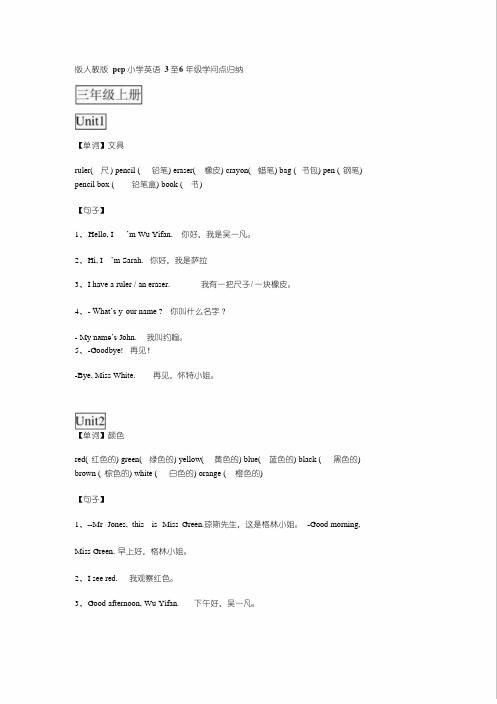
版人教版pep 小学英语 3 至6 年级学问点归纳【单词】文具ruler( 尺) pencil ( 铅笔) eraser( 橡皮) crayon( 蜡笔) bag ( 书包) pen ( 钢笔) pencil box ( 铅笔盒) book ( 书)【句子】1、 Hello, I ’m Wu Yifan. 你好,我是吴一凡。
2、Hi, I ’m Sarah. 你好,我是萨拉3、I have a ruler / an eraser. 我有一把尺子/一块橡皮。
4、- What’s y our name ? 你叫什么名字?- My name’s John. 我叫约翰。
5、-Goodbye! 再见!-Bye, Miss White. 再见,怀特小姐。
【单词】颜色red( 红色的) green( 绿色的) yellow( 黄色的) blue( 蓝色的) black ( 黑色的) brown ( 棕色的) white ( 白色的) orange ( 橙色的)【句子】1、--Mr Jones, this is Miss Green.琼斯先生,这是格林小姐。
-Good morning,Miss Green. 早上好,格林小姐。
2、I see red. 我观察红色。
3、Good afternoon, Wu Yifan.下午好,吴一凡。
4、-Nice to meet you. -Nice to meet you, too.5、Colour it brown!见到你很快活。
见到你也很快活。
把它涂成棕色吧!【单词】身体部位face( 脸) ear ( 耳朵) eye ( 眼睛) nose( 鼻子) mouth ( 嘴) arm ( 胳膊)hand( 手) head ( 头) body ( 身体) leg ( 腿) foot ( 脚)【句子】1、--How are you? 你好吗?-- I ’m fine, thank you. -- Let’s go to school!我很好,感谢你。
(完整版)三至六年级英语语法知识汇总

三至六年级英语语法知识汇总一、词类:1、动词:行为动词、be动词、情态动词。
(1)行为动词原形、+s/es、+ed、+ing,具体判断方法如下:(2)be动词a、Am--was Is --was Are--were 口诀:我用am, 你用are, is用在他她它,所有复数全用are。
b、肯定和否定句I am (not) from London. He /She is(not) a teacher. My hair is(not) long. Her eyes are(not) small.c、一般疑问句Am I …? Yes, you are. No, you aren’t. Are you/they…? Yes,we/ they are. No,we/ they aren’t. Is the cat fat? Yes, it is. No, it isn’t.is、am、are为一类,一般用于一般现在时、现在进行时和一般将来时中。
was和were为另一类,一般用于一般过去时。
(3)情态动词can、must、should、would、may。
情态动词后动词总是用原形。
(不受其他任何条件影响)2、名词这里强调两点:不可数名词都默认为单数,所以总是用is或者was。
如何加后缀:a.一般情况下,直接加-s,如:book-books, bag-bags, cat-cats, bed-bedsb.以s. x. sh. ch结尾,加-es,如:bus-buses, box-boxes, brush-brushes, watch-watchesc.以“辅音字母+y”结尾,变y为i, 再加-es,如:family-families, strawberry-strawberriesd.以“f或fe”结尾,变f或fe为v, 再加-es,如:knife-knivese.不规则名词复数: man-men, woman-women, policeman-policemen, policewoman-policewomen, mouse-mice child-children foot-feet ,.tooth-teeth fish-fish, people-people, Chinese-Chinese, Japanese-Japanese3、形容词(包括副词)形容词表示某一事物或的特征,副词表示某一动作的特征。
三到六年级英语语法知识点归纳

三到六年级英语语法知识点归纳1. Parts of Speech- Nouns: person, place, thing, or idea.- Pronouns: replace nouns in sentences.- Verbs: show action or state of being.- Adjectives: describe nouns.- Adverbs: describe verbs, adjectives, or other adverbs.- Prepositions: show relationships between nouns and pronouns.- Conjunctions: connect words, phrases, or clauses.- Interjections: express strong emotions.2. Sentence Structure- Subject and Predicate: every sentence has a subject (who or what the sentence is about) and a predicate (what the subject is doing or what is being said about the subject).- Simple, Compound, and Complex Sentences: understanding how to create different types of sentences using conjunctions and punctuation.3. Tenses- Present, Past, and Future Tenses: understanding how to change the form of verbs to indicate when an action takes place.4. Plurals- Regular and Irregular Plural Nouns: learning the rules for forming plurals and memorizing irregular plural forms.5. Possessives- Forming possessive nouns and pronouns using apostrophes.6. Contractions- Shortening words by combining them and replacing missing letters with an apostrophe.7. Articles- Definite (the) and Indefinite (a, an) Articles: understanding when to use these small words before nouns.8. Comparatives and Superlatives- Comparing adjectives and adverbs using -er and -est endings or the words "more" and "most".9. Subject-Verb Agreement- Ensuring that the subject and verb in a sentence agree in number and person.10. Capitalization and Punctuation- Knowing when to capitalize the beginning of sentences, proper nouns, and titles; understanding the use of periods, commas, question marks, and exclamation points.11. Possessive Adjectives and Pronouns- Using "my, your, his, her, its, our, their" as possessive adjectives and "mine, yours, his, hers, its, ours, theirs" as possessive pronouns.12. Direct and Indirect Objects- Identifying the receiver of the action (direct object) and the person or thing that receives what the direct object is acted upon (indirect object) in a sentence.。
[译林版]3-6年级英语语法部分总结
![[译林版]3-6年级英语语法部分总结](https://img.taocdn.com/s3/m/e6024456a55177232f60ddccda38376baf1fe038.png)
[译林版]3-6年级英语语法部分总结一、基础语法知识1. 名词- 可数名词:表示可以数的名词,有单数和复数形式。
例如:book(书),books(书籍)- 不可数名词:表示不可数的名词,只有单数形式。
例如:water(水),milk(牛奶)2. 代词- 人称代词:表示人的称谓,有主格和宾格形式。
例如:I (我),you(你)- 物主代词:表示所有关系,有形容词性和名词性形式。
例如:my(我的),mine (我的东西)- 反身代词:表示自己的行为对自己产生影响。
例如:myself (我自己),yourself(你自己)3. 动词- 现在时态:表示现在正在进行或经常发生的动作。
例如:I play football.(我踢足球。
)- 过去时态:表示过去发生的动作或状态。
例如:He played basketball yesterday.(他昨天打篮球。
)4. 形容词和副词- 形容词:用来描述名词或代词的特征。
例如:beautiful(美丽的),big(大的)- 副词:用来修饰动词、形容词或其他副词。
例如:quickly (快速地),carefully(小心地)二、语法规则1. 句子的基本结构- 陈述句:由主语和谓语构成,陈述一个事实或状态。
例如:She is reading a book.(她正在读一本书。
)- 疑问句:用来询问信息或确认事实。
例如:Are you ready?(你准备好了吗?)- 祈使句:用来表达请求或命令。
例如:Please help me.(请帮助我。
)2. 时态的使用- 现在进行时:表示现在正在进行的动作。
例如:She is eating lunch.(她正在吃午饭。
)- 过去进行时:表示过去某个时间正在进行的动作。
例如:I was studying when she called me.(她给我打电话时,我正在研究。
)3. 介词的用法- 表示位置:in(在...里面),on(在...上面),under(在...下面)- 表示方向:to(到...去),from(从...来)- 表示时间:at(在...时刻),after(在...之后)三、常见错误1. 动词时态错误- 错误示例:He play football yesterday.- 正确示例:He played football yesterday.2. 名词单复数错误- 错误示例:I have two bookses.- 正确示例:I have two books.3. 代词使用错误- 错误示例:Give me your sport shoes. They are my.- 正确示例:Give me your sport shoes. They are mine.四、总结本文总结了3-6年级英语语法的基础知识和常见错误,涵盖了名词、代词、动词、形容词、副词、句子结构、时态和介词的使用。
3~6年级英语重点知识

3~6年级英语重点知识
3-6年级英语学习是给孩子们打一个基础,是为他们今后更高级的英语学习打下坚实的基础。
英语学习贯穿孩子成长的整个过程,每一个孩子在学习英语时,都会经历不同的学习阶段。
从3~6年级的英语学习,就是孩子们最初的英语学习全过程。
3~6年级的英语重点知识,是孩子们需要重点学习的知识点,可以分为四大部分,即音标、词汇、句型和写作。
一、音标:3~6年级孩子,首先要掌握英语音标,从而掌握发音的基本知识。
在这个阶段,尤其要注意字母发音和音素组合,并且要学会读出各类口头和书面惯用构词法,养成良好的语音习惯,正确读出字母、单词和短语的发音,以此来培养孩子的英语发音能力。
二、词汇:孩子们在这个阶段,要掌握一定数量的基本词汇,要学会把一些熟悉的单词应用到实际的语言情景中去,学会了解单词的语素构成、意义及拼写,完成识读、理解、记忆单词及其用法。
三、句型:在这个阶段,孩子们开始使用英语进行交流,要学习句型,如一般将来时、现在完成时、一般现在时、一般过去时、祈使句等,掌握句型,有助于孩子们进行口头和书面表达。
四、写作:3~6年级孩子开始学习英语写作,要学习内容分析、框架结构、句子构造、拼写检查等英语写作技巧,可以帮助孩子逐步掌握英语写作能力,使孩子在学习英语的过程中,有良好的习惯和方法,并且从容应对以后的学习任务。
以上就是3~6年级英语学习重点知识,只有把最基础的东西学
习到位,孩子们才能有所收获,有所进步,很好地参与到今后的英语学习中。
我们的父母、老师要为孩子们提供充足的学习环境和良好的学习管理模式,让他们在轻松愉快的氛围中,以最佳的效果,掌握英语重点知识,迈向更高的英语学习水平。
三到六年级重点英语知识点

三到六年级重点英语知识点一、基础语法知识1. 时态三到六年级的学生需要掌握基本的英语时态,包括一般现在时、一般过去时和一般将来时。
学生需要能够正确运用这些时态来表达不同的动作和状态。
例如:- 现在时:I play football every Sunday.(我每个星期天踢足球。
)- 过去时:He watched a movie last night.(他昨晚看了一部电影。
)- 将来时:They will go to the park next week.(他们下周将去公园。
)2. 代词学生需要学会使用人称代词(如I、you、he/she等)和物主代词(如my、your、his/her等)来替代并指代不同的人或物。
例如:- 人称代词:She is my sister.(她是我的妹妹。
)- 物主代词:This is his book.(这是他的书。
)3. 名词复数学生需要掌握名词的复数形式的规则,如一般名词加s,以s、x、ch、sh结尾的名词加es等。
例如:- 单数名词:dog(狗)- 复数名词:dogs(狗们)4. 形容词学生需要学会使用形容词来描述人、物或事物的特征和属性。
例如:- 原级形容词:big(大的)- 比较级形容词:bigger(更大的)- 最高级形容词:biggest(最大的)二、常用词汇及表达1. 数字学生需要学会用英语表达0到100的数字,并掌握基本的数学运算词汇,如加、减、乘、除等。
例如:- 数字:one(一)、two(二)、three(三)、...- 加法:5 + 3 = 8(五加三等于八)- 减法:10 - 2 = 8(十减二等于八)- 乘法:4 × 2 = 8(四乘以二等于八)- 除法:16 ÷ 2 = 8(十六除以二等于八)2. 学科词汇学生需要学会用英语表达与不同学科相关的词汇,如数学、科学、语文、体育等。
例如:- 数学:mathematics(数学)- 科学:science(科学)- 语文:language arts(语文)- 体育:physical education(体育)3. 日常用语学生需要学会用英语表达日常生活中常用的问候语、感谢、道歉、请示等。
英语3~6年级所有知识点
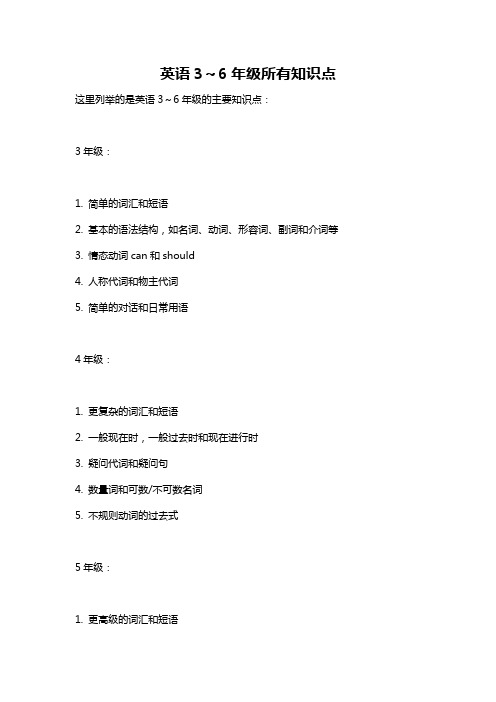
英语3~6年级所有知识点这里列举的是英语3~6年级的主要知识点:
3年级:
1. 简单的词汇和短语
2. 基本的语法结构,如名词、动词、形容词、副词和介词等
3. 情态动词can和should
4. 人称代词和物主代词
5. 简单的对话和日常用语
4年级:
1. 更复杂的词汇和短语
2. 一般现在时,一般过去时和现在进行时
3. 疑问代词和疑问句
4. 数量词和可数/不可数名词
5. 不规则动词的过去式
5年级:
1. 更高级的词汇和短语
2. 进行时态和完成时态
3. 直接引语和间接引语
4. 情态动词must和might
5. 名词性从句和定语从句
6年级:
1. 高级的词汇和短语
2. 各种时态的被动语态
3. 完成进行时和虚拟语气
4. 非限制性定语从句和宾语从句
5. 英语文章和文学作品的阅读和理解
以上只是一些主要的知识点,英语学习的过程还需要不断扩展视野和拓宽知识面,不要放弃学习和练习,多积累英语背景知识和语言技巧,才能更好地掌握英语。
三至六年级英语必背知识点

一、基础语法1.一般现在时:表示经常性的、习惯性的或真理性的动作或状态。
2.一般过去时:表示过去一些时间发生的动作或存在的状态。
3. 表达过去习惯的方式:used to + 动词原形。
4.现在进行时:表示现在正在进行的动作,常与现在时间状语连用。
5. 情态动词can/could:表示能力、许可或请求。
6. 情态动词should/shouldn't:表示建议或劝告。
7.数词的表达方式:基数词和序数词的用法。
8.比较级和最高级的形式及用法:形容词和副词的比较级和最高级的构成和用法。
9. 定冠词和不定冠词的用法:the、a/an的用法。
10.名词单复数的形式及用法:不规则名词的复数形式。
二、日常用语1. 问候和道别的常用表达:例如Hello, Hi, Good morning, Goodbye, Bye等。
2. 自我介绍和介绍他人的常用表达:例如My name is…, I am…, This is…等。
3. 家庭和亲属的称呼:例如father, mother, sister, brother, grandparents等。
4. 日常生活中常用的动词和词组:例如eat, drink, sleep, get up, go to school, do homework等。
5. 表述喜欢和不喜欢的表达方式:例如I like…, I don't like…,I love…等。
6. 询问和表达年龄的句型:例如How old are you?, I am… years old等。
7. 询问和表达兴趣爱好的句型:例如What do you like to do?, I like…等。
9. 表述天气的常用句型:例如What's the weather like today?,It's sunny, rainy, cloudy等。
10. 询问和表达方向的句型:例如Excuse me, How can I get to…?, Go straight, Turn left/right等。
小学英语三到六年级知识点整合

三年级上册重点知识点复习Module 1Unit 1 I’m Sam.我是山姆。
Unit 2 How are you? 你好吗?一、重点短语:1. goodbye再见2.good morning 早上好二、重点句子:1. I am ...= I’m... 我是...2. How are you? 你好吗?3. I’m fine, thank you.我很好,谢谢。
Module 2Unit 1 I’m Ms Smart.我叫斯马特.Unit 2 What’s your name?你叫什么名字?一、重点短语good afternoon 下午好二、重点句子1. I’m fine. And how are you?我很好。
你呢?2. I’m fine too. Thank you.我也很好。
谢谢。
3. What’s your name? = Your name, please?你叫什么名字?I’m … / …我叫……4. W hat’s ...? = What is...? 是什么?Module 3Unit 1 Point to the door. (请)指向门。
Unit 2 Ponit to the desk. (请)指向桌子。
一、重点短语1. point to指向2. sit down 坐下3. stand up起立4. boys and girls 男孩女孩们二、重点句子1. Sit down, please!请坐下!2. Please stand up!请起立!3. Point to the door.指向门。
Module 4Unit 1 It’s red.它是红色的。
Unit 2 It’s a black dog.它是一只黑色的狗。
一、重点短语red cat 红色的猫blue cat 蓝色的猫green cat 绿色的猫black cat 黑色的猫yellow cap 黄色的帽子二、重点句子1.My name is Panpan. I’m a panda. 我叫盼盼。
人教版小学三至六年级英语知识点归纳总结

人教版小学三至六年级英语知识点归纳总结形式正确记忆家庭成员的称呼,如:husband。
wife。
brother。
sister。
uncle。
aunt。
son。
daughter。
掌握这些词汇可以帮助学生更好地描述自己的家庭和亲人。
掌握形容词的正确用法,如:beautiful。
old。
pretty。
tall。
short。
cute。
strong。
slim。
long等。
这些形容词可以用来描述人或物的外貌、特征和性质。
学生需要掌握名词的单数和复数形式。
比如:XXX。
mouse-mice等常见的名词复数形式需要记忆和掌握。
常见题型选择题、填空题、连线题、听力题等。
这些题型都会涉及到以上三个知识点的考察。
四年级上册英语专题动词时间考点掌握动词的基本形式、过去式和现在分词形式,如:play-played-playing等。
掌握时间的表达方式,如:days of the week。
months of the year。
seasons等。
掌握一些常用的动词短语,如:look after。
take care of。
get up等。
分值比例5-8分8-10分常见题型选择题、填空题、连线题、听力题等。
这些题型都会涉及到以上三个知识点的考察。
学生需要掌握动词的基本形式、过去式和现在分词形式,如:play-played-playing等。
这些动词形式在日常交流中经常用到,掌握它们可以帮助学生更好地表达自己的意思。
学生需要掌握时间的表达方式,如:days of the week。
months of the year。
seasons等。
这些时间词汇在日常生活中也经常用到,掌握它们可以帮助学生更好地描述时间和时间顺序。
学生需要掌握一些常用的动词短语,如:look after。
take care of。
get up等。
这些动词短语可以帮助学生更好地描述自己的行为和日常活动。
五年级上册英语专题代词形容词比较级考点掌握人称代词、物主代词、反身代词等代词的用法。
小学三至六年级英语复习知识点梳理汇总

小学三至六年级英语复习知识点梳理汇总好好学习,天天向上,你是最棒的!小学三至六年级英语复习知识点梳理汇总第一册(三年级上)一、词汇常用物品:door。
window。
desk,chair。
blackboard。
schoolbag。
pencil。
pen。
book。
cap,present。
cake。
ball。
kite (门,窗,桌子,椅子,黑板,书包,铅笔,钢笔,书,帽子,礼物,蛋糕,球,风筝)颜色:red。
blue。
yellow。
green。
black(红色,蓝色,黄色,绿色,黑色)动物:panda。
dog。
cat。
bird。
chameleon(熊猫,狗,猫,鸟,变色龙)数字:one。
two。
three。
four。
five。
six。
seven。
eight。
nine。
ten,eleven。
twelve(一,二,三,四,五,六,七,八,九,十,十一,十二)身体器官:head。
leg。
foot。
arm。
hand。
nose。
eye。
mouth。
ear(头,腿,脚,手臂,手,眼睛,鼻子,嘴巴,耳朵)家庭成员:mother。
father。
grandpa。
grandma。
sister。
brother(妈妈,爸爸,爷爷,奶奶,姐姐,弟弟)职业:teacher。
pupil。
doctor。
driver。
nurse。
farmer。
policeman(老师,学生,医生,护士,司机,农民,警察)代词:I。
you。
it。
me。
he。
she。
your。
my。
his。
her。
this。
that(我,你,它,我,他,她,你的,我的,他的,她的,这个,那个)进修是件康乐的事情,加油!好好学习,天天向上,你是最棒的!二、句型1、打号召及问好:Hello!(你好)Hi!(你好)早上晤面说:Good morning.(上午好!)下午见面说:Good afternoon.(下午好!)跟人道别语:Goodbye.(再见)Byebye.(再见)跟人道谢语:Thank you!(谢谢你!)Thanks!(多谢)询问对方的身体情况:How are you?I’m fine。
- 1、下载文档前请自行甄别文档内容的完整性,平台不提供额外的编辑、内容补充、找答案等附加服务。
- 2、"仅部分预览"的文档,不可在线预览部分如存在完整性等问题,可反馈申请退款(可完整预览的文档不适用该条件!)。
- 3、如文档侵犯您的权益,请联系客服反馈,我们会尽快为您处理(人工客服工作时间:9:00-18:30)。
三至六年级英语知识点归纳总结:三年级上册英语专题考点存在主要问题分值比例常见题型字母26个字母的大,小写和五个元音字母26个字母的正确发音与前后顺序的记忆。
5-8分填空题名词名词的单,复数形式不能正确写出可数名词的复数形式,如:tooth-teeth,mouse-mice.8-10分单词分类介词in,on,under等介词的用法对介词的用法掌握不透,导致使用错误。
3-5分选择题;看图选择正确的单词。
冠词a,an,the的用法在不定冠词的用法上会混淆,不理解“an”用于元音音素开头的名词前。
1-2分选择题特殊疑问词what, how,where, what colour,how many的用法在特殊疑问词的运用方面不够灵活。
3-5分选择题;按实际情况回答问题。
There be 句型There is和there are的用法there are后面接名词复数,学生常常忽视。
2-4分选择题;按实际情况回答问题。
Be动词am,is ,are的正确运用不能随着人称的变化而变化,如:Are you tall?Yes,I am.are常忘了改成am.you常忘了改成I. 3-5分选择题;填空题情景对话日常问候语中,差生对情景对话不够熟练,易失分。
5-8分选择正确的句子完成对话。
单词有关身体部分,学习文具,颜色,交通工具,数字的单词。
大部分学生对颜色,交通工具,数字的单词掌握不了。
8-10分单词分类;听力题;看图写单词句型有关用特殊疑问词如:what colour, howmany提问的句子,以及一般疑问句对特殊疑问句掌握不透,导致选择错误。
3-5分按实际情况回答问题听力重要单词,短语,句子。
听句子,把所缺的单词补充完整这种题型最易失分。
40-50分选择听到的内容;听句子,把所缺的单词补充完整。
三年级下册英语有关家庭成员的称呼husband,wife,brother,sister,uncle,aunt,son,daughter的记忆。
不理解家谱的关系,不能写出正确的称呼。
2-3分选择题;填空题。
形容词Beautiful,old,pretty,tall,short,cute,strong,slim,long等形容词的正确运用。
难以区分tall和long,pretty和cute。
1-2分选择题;填空题。
名词名词的单,复数中,差生对名词复数的不规则变化掌握不透。
3-5分选择题;看图写单词;用名词的正确形式填空。
近义词some,any,have,has的用法。
学生常忽视了陈述句改为一般疑问句时,some要改为any。
主语为三单时要使用has。
2-4分选择题;填空题。
国家与国籍国家与国籍名称的区分;国旗的区分。
难以区分国家与国籍的名称及国旗的标志。
2-3分选择题;听力题;看图回答问题。
有关家具的名称bed,wardrobe,door,chair,floor,lamp,fridge等名词的单,复数。
有关家具名词的单,复数难以掌握。
2-3分选择题;单词分类;看图写单词。
介词against,by,in,on,infront of,beside,behind的用法。
对against, in frontof,beside,behind的用法不够灵活。
2-3分选择题;看图写单词。
There be 句型there is 与there are的用法。
学生常忽视了名词复数要用there are。
2-3分选择题;按实际情况回答问题。
有关家庭各功能室的名称kitchen,livingroom,bedroom,bathroom,study的区分。
对有关家庭各功能室的名称分不清,导致用词不当。
2-3分选择题;单词分类;看图写单词。
有关公共场所的名称building,headmaster’soffice,library,playground,teachers’room的区分。
对单词记忆不牢,难以区分各公共场合的名称。
2-3分选择题;听力题;看图写单词;单词分类。
名词的所有格名词单数与复数的所有格形式。
大部分学生不能掌握名词复数的所有格,如:headmaster’s office,teachers’room。
1-2分选择题;听力题。
特殊疑what,where,who等特学生对特殊疑问词的用法2-4分选择题;按实问词殊疑问词的用法。
掌握不透。
际情况回答问题。
听力重要单词,短语,句子。
听句子,把所缺的单词补充完整这种题型最易失分。
40-50分选择听到的内容;听句子,把所缺的单词补充完整。
四年级上册英语专题考点存在主要问题分值比例常见题型数词数词的用法数词的区分,如:fourteen与forty,twelve与twenty. 3-5分听力题;选择题;单词分类。
名词名词的单,复数形式不能正确写出可数名词的复数形式,如:child-children3-5分听力题;选择题;单词分类。
名词的所有格名词的所有格形式以s 或不以s结尾的复数名词的所有格形式易写错1-2分选择题介词in,on,with,for,at的用法对介词的用法掌握不透,导致使用错误。
3-5分选择题冠词a,an,the的用法在不定冠词的用法上会混淆,不理解“an”用于元音音素开头的名词前。
2-4分选择题形容词形容词的用法学生对一些形容词的近义词或反义词掌握不好1-3分填空题;选择题。
一般现在时态动词的三单形式主语为第三人称单数时,学生常常忽视了行为动词要变化1-3分选择题;选择正确的词填空。
时间的表达法考查学生对时间的表达学生对时间的表达容易和数词混淆2-4分填空题;听力题。
特殊疑问词What, how,where,whatcolour, howmany等的用法在特殊疑问词的运用方面不够灵活。
3-5分选择题;按实际情况回答问题。
情景对话有关谈论购物,职业,日常活动及作息的话题。
对问价格的句子和it,them的使用;日常活动及作息的话题不熟练。
5-8分选择题;选择句子把对话补充完整。
短语from…to…,want to be, 学生不能正确使用短语3-5分选择题;选择正确的help…with…词填空。
句型有关问价格,职业,日常活动及作息的句子。
差生对句子不熟练,导致在做选择题和听力题中失分较大。
8-10分听力题;选择句子把对话补充完整;按实际情况回答问题。
听力重要单词,短语,句子。
40-50分选择听到的内容;听句子,把所缺的单词补充完整。
四年级下册英语现在进行时态动词的形式;句型转换。
对陈述句转换成一般疑问句掌握不透。
5-10分听力题;选择题;按实际情况回答问题;用动词的正确形式填空。
一般现在时态动词的三单形式对动词的三单形式掌握不透2-3分选择题;用动词的正确形式填空。
名词名词的单,复数形式。
以o结尾的名词,有生命的加es, 无生命的加s。
学生常忘记这一点。
3-5分选择题;用名词的正确形式填空。
特殊疑问词how old,what,who,which,howmany,where,what time,how much的用法。
在特殊疑问词的运用方面不够灵活。
3-5分选择题;填空题。
近义词too,also,either,still,yet的用法。
学生对also和either,still和yet的用法会混淆。
1-2分选择题。
冠词a,an,the的用法。
在乐器前常忘了使用定冠词the,如:play the guitar.1-2分选择题。
名词的所有格名词的所有格形式。
对无生命的名词所有格掌握不透,如:the pupils of Class One,asetter of a world record.1-2分选择题。
形容词interesting,boring,fun,great的正确运用。
对形容词的运用不够灵活。
1-2分选择题;单词分类。
名词名词的单,复数形式与不可数名词。
难以区分可数与不可数名词,对一些可数名词的复数形式掌握不透。
3-5分选择题;单词分类;选词填空。
情景对话邀请与购物用语。
对邀请与购物用语不熟练。
3-5分选择题;选择正确的句子把对话补充完整。
短语year(s) old,listen to,be goodat的灵活运用。
在大于数字1时,学生常忘了在year后面加s,be good at后面的动词常忘了改为ing形式。
2-3分选择题;填空题。
句型有关问年龄,运动的句子以及邀请和购物用语。
对句型不够熟练。
3-5分选择题;按实际情况回答问题。
五年级上册英语专题考点存在主要问题分值比例常见题型一般现在时态行为动词变化方式主语为第三人称单数时,学生常常忽视了行为动词要变化5-8分选择题;用动词的适当形式填空;句型转换;阅读理解;写作。
数词基数词与序数词:区别、拼写用动词的适当形式填空;句型转换、就划线部分提问、变否定句、疑问句等。
(学生易出错)3-5分用动词的适当形式填空;按实际情况回答问题;句型转换、就划线部分提问、变否定句、疑问句等;选择日期,月份日期的表达,十二个月份的掌握中,差等生对日期的表达,月份的动词掌握不好3-5分选择题;填空题。
情态动词Can的用法句型转换;按实际情况回答问题.(学生易出错)2-3分句型转换;用所给单词连成句子;找出不同类单词;按实际情况回答问题。
介词in,on,at,by,with的用法对介词的用法掌握不透,导致使用错误。
3-5分选择题;完型填空;阅读理解。
一般将来时态be going to用法be going to的用法不够灵活3-8分选择题;句型转换;阅读理解;写作。
时间的表达时间的直接与间接表达法学生易把past和to的用法混淆2-4分选择题;填空题;按实际情况回答问题。
特殊疑问词what,how,where,what time的用法在特殊疑问词的运用方面不够灵活。
3-5分选择题;填空题;句型转换。
问路句型问路的句型大部分学生对问路用语掌握不透。
5-10分选择题;情景对话;看图写句子。
祈使句Don't 易忽视Don't接的是动词原形1-2分选择题。
行为动词变化方式一般现在时动词的第三人称单数;助动词,Don't;begoing to后面的动词形式学生常常对一般现在时态动词的三单形式掌握不透。
3-5分选择题;用动词的适当形式填空。
听力重要的单词,短语,句型。
听问题,选择正确的答语;听短文,判断句子的正误这两种题型是学生失分最多的。
40-50分选择听到的内容;听句子,把所缺的单词补充完整;听问题,选择正确的答语;听短文,判断句子的正误。
单词有关数词,月份,植物,动物,公共场所的单词。
学生对一些序数词,月份,公共场所的单词记忆不牢。
5-8分单词分类;选择题;填空题。
句型有关问路,谈论计划,日常生活等的句子。
学生在问路和指路的句子中易失分。
3-5分选择题;情景对话。
作文有关写日常生活,动物,植物,计划,问路与指路的作文。
